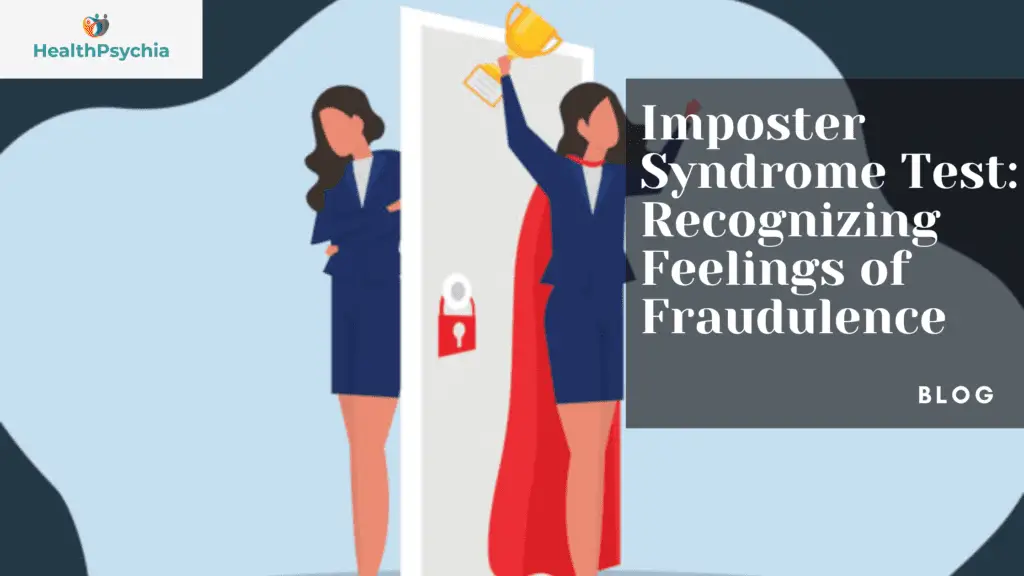Imposter syndrome is a psychological condition in which a person doubts their success and has a constant fear of being found out as fake even though there is proof that they are good at what they do. Characteristics include doubting one’s own abilities and always worrying that one will be revealed as a fake in some aspect of life.
Pauline Clance and Suzanne Imes, two psychologists, came up with the name “imposter syndrome” in the 1970s. At the time, they had seen this feeling in high-achieving women. But now we know that imposter syndrome can happen to people of any gender and all kinds of situations.
People with imposter syndrome often think things like I do not deserve this success, or I am just lucky, not talented. Imposters can minimize their accomplishments, credit success to other circumstances, or neglect good comments as dishonest. These concepts and ideas can be very harmful, leading to low self-esteem, more worry, and unwillingness to try new things.
Signs and Symptoms of Imposter Syndrome
Although each person’s syndrome may appear different, there are a few similar symptoms and indications to watch out for.
- Constant self-doubt: People with imposter syndrome always doubt their skills and think that others are deceived by their apparent competence.
- Fear of losing: People are very afraid of making faults or failing because they see it as proof that they are fakes.
- Discounting accomplishments: People who suffer from imposter syndrome frequently have the tendency to minimize their success and place them on other reasons such as chance or the assistance of others.
- Overworking and trying to be perfect: The need to constantly show that you are good at what you do can cause you to work too much and have too high of standards for yourself.
- Stress and tension: The fear of being found out as a fake can cause a lot of stress and tension, which can make you worry all the time and feel like you are drowning.
- Comparison to others: One of the most prominent characteristics of imposter syndrome is the tendency to constantly compare oneself to others and a related experience of failure when doing so.

Understanding the Causes of Imposter Syndrome
Imposter syndrome can be caused by many things like how you were raised, your attitude, and what you think society aspects of you. Some common reasons include:
- Perfectionism: People who tend to be perfectionists tend to set unrealistic goals for themselves, which makes them constantly afraid of falling short and being found out as fake.
- Early Experiences: Experiences that occur throughout childhood, such as getting an excessive amount of praise or opposition, can affect views that an individual has about their talents and lead to imposter syndrome.
- Culture and social expectations: Feelings of imposter syndrome can be made worse by peer pressure to do well and succeed, which can make people feel like they need to keep proving themselves.
- Attribution style: People with imposter syndrome often blame their wins on luck or events while they blame their mistakes on their own flaws, which makes them feel even more like frauds.
- Lack of validation: If a person’s success is not recognized or validated enough, they may start to question their own skills. This can lead to imposter syndrome.
The Impact of Imposter Syndrome on Mental Health
Imposter syndrome is capable of having a big effect on a person’s psychological health and happiness as a whole. The continual worry of being found out as a fake and the sense of failure that comes with it can lead to:
- High stress and fear: Constant worry about being found out as useless can be hard on a person’s emotional and mental well-being.
- Lack of confidence and self-esteem: People with imposter syndrome often have low confidence and self-worth, which makes it hard for them to see and value their own skills and accomplishments.
- Procrastination and avoiding new opportunities: The fear of failing and being found out as fake can cause people to put things off to prevent new opportunities.
- Burnout and Overworking: Wanting to show yourself all the time and being afraid of being judged as not good enough can result in burnout and an endless cycle of overworking.
- Relationship stress: People with imposter syndrome may find it hard to acknowledge praise or depend on other people for help which can hurt their personal and work relationships.

Recognizing Imposter Syndrome in the Workplace
Imposter syndrome can make a big difference in a person’s career. It is common in people who are successful, and it can show up in different ways at work. In the context of a professional environment, some frequent indications of imposter syndrome include the following:
- Reluctance to speak up: People with imposter syndrome can feel afraid to share what they are thinking because they are worried they will be laughed at or viewed as not good enough.
- Overworking and trying to be perfect: The need to show oneself can make a person work too much, set impossible goals and try to do everything perfectly.
- Difficulty accepting praise: Individuals with imposter syndrome may find it hard to accept praise or positive comments thinking that they are not real or not deserved.
- Fear of failure: Fear of making error mistakes or losing can keep people from trying new things or taking advantage of chances to grow.
- Comparison to coworkers: A typical sign of imposter syndrome at the workplace of employment is frequently comparing yourself to coworkers and feeling like you don’t measure up.
Overcoming Imposter Syndrome: Strategies and Techniques
Even though imposter syndrome can be hard to get rid of, it is achievable to do so with proper techniques and tactics. Here are a few specific actions you can do to beat imposter syndrome:
- Discover negative ideas and opinions: Discover negative ideas and opinions and question them. The first step is to find and question the negative ideas and concepts that lead to imposter syndrome.
- Celebrate your successes: Take the opportunity to recognize and celebrate your successes, no matter how big or small they are. Keep track of what you have done well and go back to it when you start to doubt yourself.
- Accept helpful feedback: Instead of ignoring praise, learn to take them in a polite way and use them as ways to improve. Consider that every person makes faults, and that advice helps you to get better.
- Set realistic goals: Set goals that you can achieve. Don’t set standards that you can’t reach. Break up big goals into simpler, more doable steps and focus on making progress instead of being perfect.
- Practice self-compassion: Self-compassion means being kind and caring to yourself, just like you would be to a friend. Realize that committing mistakes and feeling uncertain are normal parts of learning, as well as being kind to you when things are hard.
- Seek support and mentorship: Speak out to trusted coworkers, friends, or teachers who can give you advice, support, and a different point of view. Discussing how you feel with other people may assist you in realizing that you are not alone in feeling like a fraud and give you helpful insights.
- Challenge the imposter within. Regularly question the imposter inside by taking risks, getting out of your zone of comfort, and welcoming new possibilities. Remember that you worked hard and had the ability to get where you are now.
Conclusion
Imposter syndrome is a regular thing that happens to a lot of people, no matter what they have done or how qualified they are. Constantly worrying about being found out as a fake can be bad for your mental health, self-worth, and general health. But with the appropriate tools and help, it can be achieved to identify the imposter syndrome and beat it.
By learning about the symptoms and reasons for imposter syndrome, people can start to question their negative opinion and ideas. Embracing self-compassion, being proud of your accomplishments, and asking for help are all important ways to get over imposter syndrome.
Remember that you would not be alone on this road and that many great people have gone through imposter syndrome and come out on top. Let rid of self-doubt, accept your power and enjoy your success without fear of being revealed as a phony. You deserve success.
FAQ
Q. 1. How can I diagnose impostor syndrome?
Ans. Extreme insecurity, Feeling inadequate, Compare yourself to others constantly and Anxiety are all the symptoms of impostor syndrome.
Q. 2. What are the 3 C’s of imposter syndrome?
Ans. The writers have designed a three-step process to help you overcome impostor syndrome and start living your greatest life: Clarify, Choose and Create.
Q. 3. What are the 5 different kinds of impostor syndrome?
Ans. Perfectionist, Superhuman, Natural Genius, Soloist and Expert are the five impostor syndrome kinds. While the categories differ in appearance, they all make you feel dishonest about your accomplishments.
Q. 4. How can I overcome impostor syndrome?
Ans.
- Know that you are not the only one.
- Make a distinction between modesty and fear.
- Let go of the perfectionist that resides within you.
- Treat yourself with compassion.
- Keep a record of your accomplishments and evaluate them.
- Have a conversation about it with an advisor and your management.
- Accept exciting new challenges by answering yes.
- Embrace the sensation, and put it to good use.


